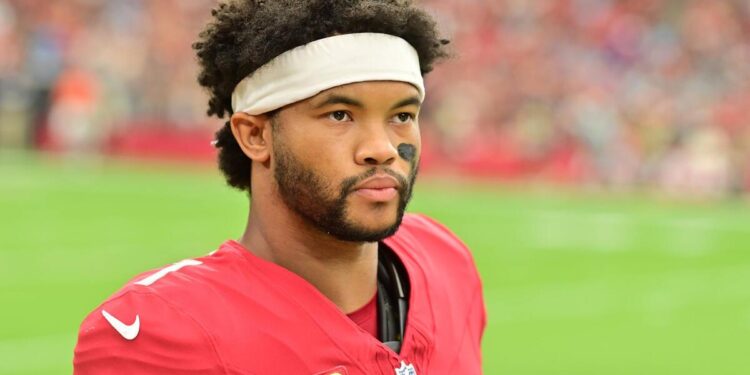In a recent turn of events that has sparked considerable discussion among fans and commentators alike, Arizona Cardinals quarterback Kyler Murray publicly apologized for donning a Michael Vick jersey during a photoshoot featuring his dog. The incident has reignited debates surrounding Vick’s controversial legacy, particularly in relation to his past conviction for animal cruelty. Murray’s choice of attire, which was intended to celebrate a personal moment, has led to a backlash that prompted the athlete to address the situation directly. In his statement, he expressed remorse for any offense caused and emphasized the importance of animal welfare, reflecting a growing sensitivity in sports culture towards such issues.
Kyler Murray’s Choice Sparks Controversy Amid Ongoing Conversations on NFL Culture
Kyler Murray’s recent decision to wear a Michael Vick jersey during a photoshoot with his dog has ignited a wave of discussion regarding the NFL’s cultural landscape and its evolving values. Vick, who was embroiled in a high-profile dogfighting scandal a decade ago, remains a polarizing figure in the sports community. While some fans view Vick’s redemption arc as a testament to growth and second chances, others are outraged by any association with his past actions. This incident has reignited debates about athlete accountability, the implications of celebrity endorsements, and the responsibilities that come with public visibility.
In light of the backlash, Murray promptly issued an apology, emphasizing that his intention was never to glorify Vick’s past but to honor his impact on the game. In a statement, he conveyed his deep respect for animals and acknowledged the sensitivity surrounding such topics. As conversations around this incident unfold, many are taking to social media to voice their opinions. The reactions can be broadly categorized into:
- Support for Murray: Advocates argue he is being unfairly judged for what was likely meant to be a lighthearted gesture.
- Criticism of Vick’s Legacy: Many assert that wearing Vick’s jersey perpetuates a disregard for animal rights and the severity of his actions.
- Discussions on Athlete Conduct: Some commentators stress the importance of athletes being role models and the potential impact of their choices on young fans.
Context of the Michael Vick Jersey: Acknowledging Past Mistakes and Influencing Future Choices
The recent controversy surrounding Kyler Murray’s photoshoot in a Michael Vick jersey has reignited discussions about accountability and the symbolism of choice in sports culture. While Vick’s jersey is a piece of athletic memorabilia, it carries a heavy weight due to his past convictions related to dogfighting. Murray’s decision to wear this jersey, especially while posing with a dog, was met with criticism that underscored the sensitive nature of Vick’s legacy. By addressing the situation directly, Murray has taken a step towards confronting the ramifications of his choices, recognizing the potential impact such an image can have on fans and pet advocates alike.
In acknowledging his mistake, Murray opens up a broader dialogue about the responsibilities of public figures and the narratives we perpetuate through our actions. Moving forward, athletes and influencers can consider the following points to guide their decisions:
- Awareness: Understanding the significance behind symbols, especially those associated with controversial figures.
- Empathy: Recognizing the feelings of those who may be affected by public representations.
- Education: Learning about the histories connected to specific icons before embracing them.
This experience could serve as a pivotal moment for not only Murray but for other athletes too, prompting a culture of mindfulness that respects the varied narratives fans hold dear.
Moving Forward: How Murray’s Apology Can Shape Athlete Advocacy and Responsibility
Kyler Murray’s recent apology following his choice to wear a Michael Vick jersey for a photoshoot symbolizes a pivotal moment in athlete advocacy and social responsibility. In his statement, Murray recognized the historical implications of Vick’s past, particularly concerning animal rights, and expressed remorse for any distress his actions may have caused. This event highlights the tremendous influence athletes hold as public figures and underscores their role in promoting positive societal change. By acknowledging the weight of his actions, Murray sets a precedent for others in the sports world to follow suit, prompting conversations around accountability and awareness in the athletic community.
The fallout from this incident has the potential to foster a broader dialogue about the responsibilities that come with celebrity status in sports. As athletes navigate their careers, they must consider how their choices resonate with fans and impact vulnerable communities. This situation provides an opportunity to redefine how sports figures engage with their platforms and advocate for causes, such as animal welfare. The lessons from Murray’s experience can help athletes move beyond personal branding and towards genuine advocacy by encouraging them to:
- Engage in continuous education about the social issues connected to their choices.
- Use their influence to raise awareness about important causes, creating a positive impact.
- Be transparent and open about their mistakes, fostering a culture of understanding and growth.
To Wrap It Up
In conclusion, Kyler Murray’s choice to wear a Michael Vick jersey during a recent photoshoot has sparked considerable discussion among fans and commentators alike. The Arizona Cardinals quarterback’s subsequent apology underscores the sensitive nature of Vick’s legacy and the impact it continues to have on discussions surrounding animal rights and sports. As athletes increasingly engage with social issues, Murray’s experience serves as a reminder of the careful navigation required in the crossover between personal expression and public perception. With his acknowledgment of the misstep, it remains to be seen how this incident will influence both Murray’s image and the ongoing dialogue surrounding the complex history of athletes and their associations.
















